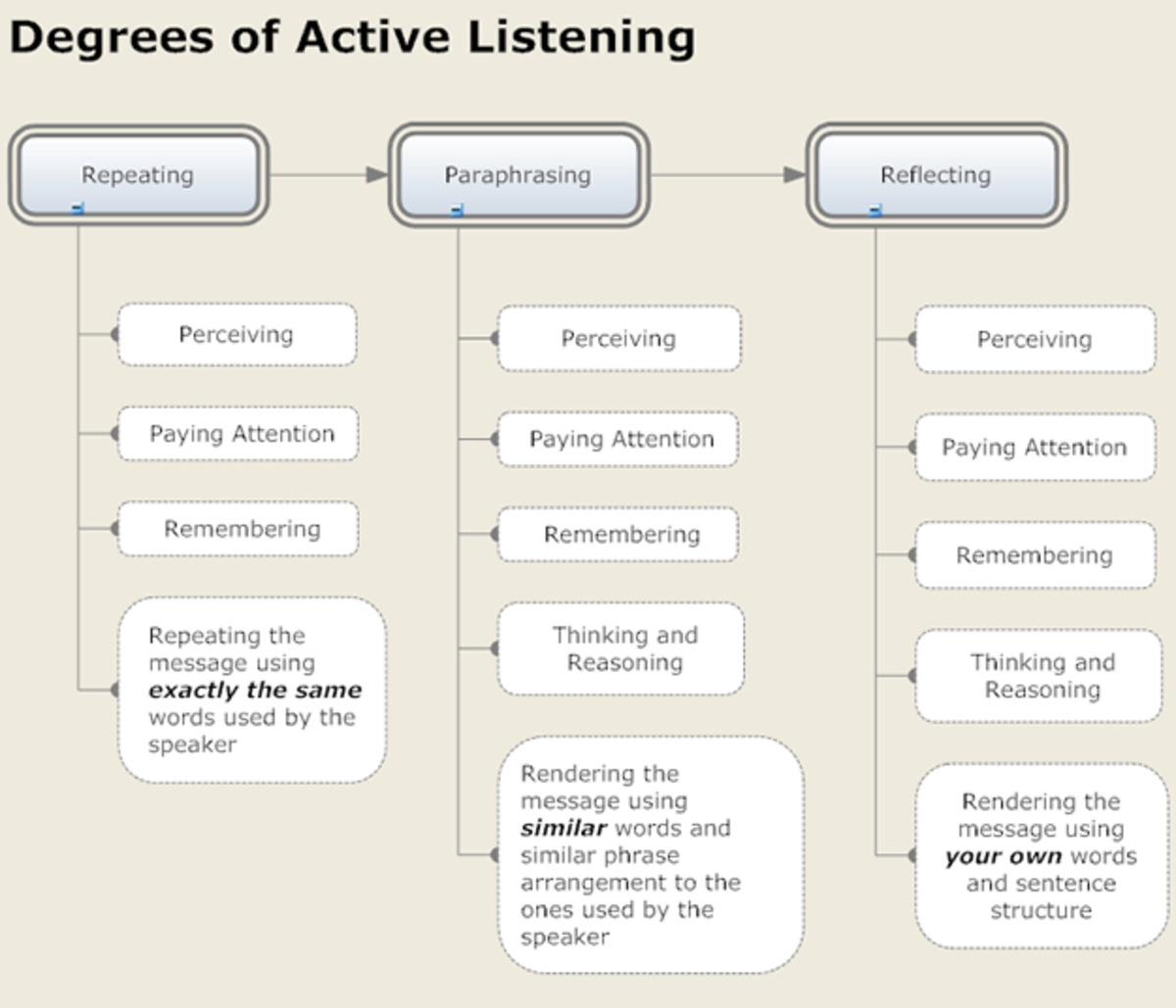Methods to Improve Your Listening Skill
Studies show that we devote 40% of our day to listening, yet, we listen at only 25% efficiency. With training, our listening skill can be improved so that we listen at level 1 more often. Some things you can do to improve your skill as a listener are:
1. Search for something you can use;findareas of common interest. If you adopt a positive attitude toward a subject, you will usually find something in any talk that will broaden your knowledge. Dry though a talk may be, it will generally contain an idea that is worthwhile to you, now or later. Sorting out elements of personal value is one area of effective listening. What is being said that I can use? What's in it for me? How does this relate to what I already know? What action could I take?
2. Take the initiative. Find out what the talker knows. Look at the talker and concentrate on what has been said. Go all the way in making the communication two-way. Ignore the person's delivery and personality if they distract you. Reach for the idea that is being conveyed. Stimulate the talker with your attentiveness and expressions of interest. Show interest by the use of noncommittal acknowledgments such as: "Oh, I see," "How about that," "mm-hmmm, interesting," "Really, you did," and so on.
3. Work at listening. Efficient listening takes energy. Practice makes it easier. If the subject is announced in advance, prepare for it by reading, by discussing it, or by thinking it over briefly, establishing your own point of view. Then listen actively and energetically.
4. Focus your attention on ideas. Listen for the speaker's central ideas. In some cases, you will recognize the conventional toastmaster
method of building a speech, from the opening introduction of the subject, the transitions from point to point as the theme evolves, the word pictures and examples, and the concluding summary or call for action. Pick out the ideas as they are presented, sort the facts from principles, the ideas from examples, and the evidence from opinion.
5. Make meaningful notes. You can improve your ability to learn and remember by making a brief record of the speaker's main points. Review your notes later on to determine what you can put to use, and whether you agree or disagree with the speaker's thesis. Efficient note-taking requires practice in selecting the right method of notes for each occasion, but whatever the method, make the notes brief, easy to interpret, and easy to review. Depending on the nature of the talk, practice making an outline, mental or written, or picking out the key words, phrases, or ideas. Stay flexible; many speakers do not follow a precise outline.
6. Resist external distractions. Where possible, resist distractions. Sit where you can see and hear without being distracted—concentrate on concentrating. When you concentrate on concentrating, you make it possible to be aware of noises without being distracted by them.
7. Hold your rebuttal; watch out for hot buttons. Don't let emotion-laden words throw you. Begin to recognize certain words that affect you to the point where you stop listening and start forming a rebuttal. One way to deal with this is to quickly analyze the reasons those words stir you, then resume listening, withholding any judgment until you fully comprehend what point the speaker is making. Another method is to jot down major rebuttal points as questions; do this briefly, not at length. Both methods can help clear your mind so that you can return to listening with an open mind.
8. Keep an open mind; ask questions to clarify understanding. Quick and heated disagreement with the speaker's main points or arguments can cause a psychological deaf spot. Keep your mind open. Give the talker more rather than less attention. Search for the full kernel of the theme. Stay out of judgmental framework by not judging what the person says as "wrong." Clarify meaning by restating, in your own words, what you thought was said.
9. Capitalize on thought speed; summarize. The core of effective
listening is to develop the utmost concentration on the immediate listening situation. Concentrate on what the talker says. Summarize in your head what the talker said. Decide how well he is supporting his points and how you would have supported them. Mentally review, after each point is covered, the progress of the theme; contrast and compare, identify the speaker's evidence.
10. Practice regularly. Get experience and practice in listening and note-taking by listening to difficult or unfamiliar material that challenges your mental capacities. Every club meeting could present many opportunities for practice. Regular practice will work wonders for you. Efficient listening takes effort, but it is one of the easiest ways known to acquire ideas and information you can use.
11. Analyze what is being said nonverbally. Be patient and sensitive to the talker's feelings. Ask yourself why the talker said what he or she did, and what she or he meant. Listen between the lines for hidden meanings. What is the person saying nonverbally?
12. Evaluate and be critical of content, not the speaker's delivery. It's important to discriminate if the talker is stating facts or assumptions. Decide how well he or she is supporting the main points and how you would have supported them. Hear the talker out before judging. Getting the talker's message is more important than his or her appearance. Don't let the talker's poor voice, mannerisms, personality, or appearance get in the way of the message. Recognize that most people are not very skilled at getting their message across.
These methods can be used to improve your listening habits. Most people discover that they can overcome poor listening habits by systematically incorporating these twelve tools into their listening behavior.








